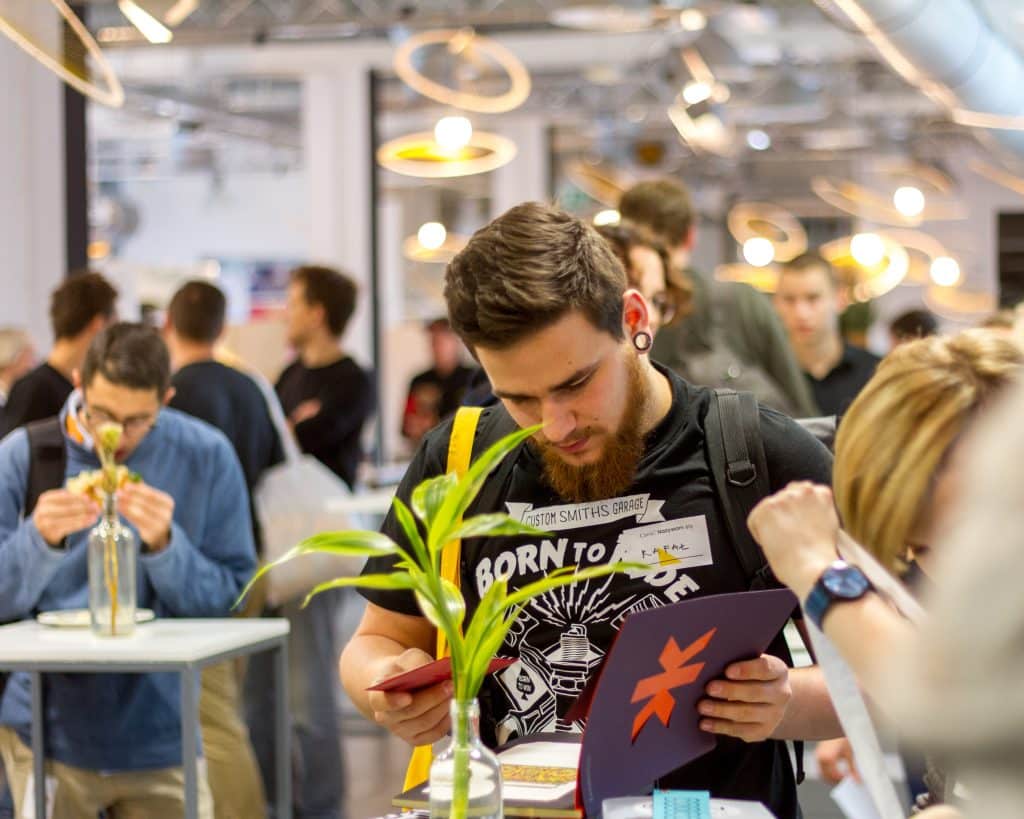How To Create Engaging Event Experiences for Eager Learners and Reluctant Participants


Every event attendee arrives with unique expectations, learning styles, and levels of enthusiasm. Curating an event experience that resonates with all can be a challenging dance — from engaging the eager beavers ready to soak up every ounce of knowledge to how to engage reluctant learners and introverts.
Yet, it’s this very diversity that makes events so enriching. Dive into the nuances of understanding the different types of attendees that grace our events and discover strategies to ensure every individual walks away with a meaningful and memorable experience.
What do people expect from attending an event?
Attendees have varying expectations when it comes to attending events. Some of the common expectations include the following:
- Learning and education: Many attendees come to events expecting to gain knowledge and learn new things. They look forward to attending informative sessions, workshops, and presentations that can enhance their skills and expertise.
- Networking: Events provide a valuable opportunity for attendees to network with industry peers, experts, and potential business partners. Attendees expect to meet new people, exchange ideas, and build professional relationships.
- Inspiration and motivation: Attendees often seek inspiration and motivation from events. They want to hear from successful speakers, industry leaders, and influencers who can share their experiences and insights. They hope to leave the event energized and motivated to achieve their goals.
- Entertainment and enjoyment: Many attendees expect events to provide entertainment and enjoyable experiences. This can include live performances, interactive activities, and social events that create a fun and engaging atmosphere.
- Access to resources and solutions: Attendees often attend events to gain access to valuable resources and solutions. They expect to find new products, services, and technologies to help them personally or professionally.
- Personal and professional development: Events offer opportunities for personal and professional growth. Attendees expect to acquire new skills, gain industry knowledge, and stay updated on the latest trends and developments.
Event organizers must understand these expectations and design their programs to ensure a positive and fulfilling experience for all attendees.

What are common challenges for event attendees?
Event attendees may face several challenges when attending events. Here are some common challenges:
- Lack of engagement: Attendees may struggle to stay engaged throughout the event, especially if the content is not relevant or interactive. This can result in a passive and disinterested audience.
- Limited networking opportunities: Networking is a crucial reason many attendees participate in events. However, they may struggle to connect with relevant industry professionals or find themselves in crowded spaces that make meaningful conversations difficult.
- Information overload: Events often offer many sessions and workshops, which can overwhelm attendees. It can be difficult to prioritize which sessions to attend and absorb all the information presented.
- Time management: Events usually have a packed schedule, and attendees may find it challenging to manage their time effectively. They may struggle to balance attending sessions, networking, and exploring the event venue.
- Lack of follow-up and action: Attendees may find implementing the knowledge and insights gained challenging after attending an event. Without proper follow-up and support, the impact of attending the event may be limited.
By understanding these challenges, event organizers can strive to create engaging and valuable experiences for attendees, addressing their needs and providing solutions to enhance their event experience.
Building Attendee Experiences for the Eager Learners
Bursting with enthusiasm and an insatiable curiosity, eager learners are the lifeblood of any event. They arrive with notebooks ready and questions at the tip of their tongue, hungry for knowledge and interaction. For these passionate attendees, every moment is an opportunity.
Who are the eager learners at your event? Here are some examples:
The Enthusiastic Professionals
- They attend events to expand their knowledge and skills in their field.
- They actively participate in workshops, seminars, and networking sessions.
- They are eager to learn from industry experts and engage in meaningful discussions.
The Networking Aficionados
- They see events as an opportunity to expand their professional network.
- They actively seek out new connections and engage in conversations with fellow attendees.
- They attend events to build mutually beneficial relationships.
The Knowledge Seekers
- They attend events to gain insights and stay updated on industry trends.
- They are avid learners who value the educational aspect of events.
- They actively participate in panel discussions, keynote speeches, and Q&A sessions.
15 Ways To Deliver the Best Event Experience for Eager Learners
Engaging eager learners at your event involves tapping into their enthusiasm, providing rich content, and offering opportunities for exploration and interaction. Here are several strategies to effectively engage eager learners:
- Understand their needs and interests: Conduct pre-event surveys to gauge topics of interest. Have informal conversations or host focus groups to understand their learning objectives.
- Provide high-quality content: Feature knowledgeable and dynamic speakers. Ensure that the content is current, relevant, and actionable.
- Incorporate interactive learning: Host workshops or breakout sessions. Use Kahoot, Slido, or Poll Everywhere to incorporate live quizzes or polls. Encourage peer-to-peer learning with group activities or discussions.
- Offer hands-on experiences: Include labs, simulations, or role-playing exercises. Consider field trips or site visits if relevant.
- Leverage technology: Offer virtual reality, augmented reality, or other tech-driven experiences. Use mobile event apps for networking, agendas, and supplementary resources.
- Promote networking: Set up dedicated networking zones or lounges. Facilitate speed networking sessions or round table discussions. Use apps or platforms that allow attendees to connect and share contacts.
- Create a dynamic environment: Opt for varied formats — lectures, panel discussions, Q&A sessions, and so on. Offer choices so learners can select the topics that interest them most.
- Provide opportunities for deeper dives: Offer extended workshops or post-event courses. Share resources, reading lists, or online courses for further exploration.
- Encourage feedback: Use live feedback tools to adjust the event in real-time. Collect post-event feedback to improve future events.
- Recognize and reward engagement: Gamify the learning experience with badges, points, or certificates for participation. Recognize attendees who actively participate or achieve certain milestones.
- Cater to different learning styles: Offer content in varied formats like visual presentations, auditory sessions, kinesthetic activities, and so on.
- Offer continuous engagement opportunities: Continue the learning experience post-event with webinars, follow-up resources, or online discussion forums. Create a community, online group, or forum where attendees can continue discussions, share resources, and network.
- Incorporate real-life scenarios: Use case studies, testimonials, or real-world examples to make the learning relevant and actionable.
- Ensure comfort: Ensure the physical environment is conducive to learning — comfortable seating, good acoustics, proper lighting, and so on. Provide breaks, refreshments, and downtime to avoid information overload.
- Empower them: Give them roles or tasks — like note-taking, moderating discussions, or leading breakout groups.
By catering to the needs and interests of eager learners and creating an environment that supports active engagement, you can ensure that your event is a memorable and valuable experience for them.

Building Attendee Experiences for the Reluctant Participants
Not everyone steps into an event with high energy or visible enthusiasm. Some attendees are masked in hesitation or reservation and might blend into the backdrop, their reluctance a shield against unfamiliar territory. These are the silent observers, the contemplative thinkers, or perhaps the first-time attendees unsure of their footing.
Navigating their needs requires a gentle touch and an intuitive approach. In this section, we’ll delve into the art of engaging and connecting with these reluctant participants, ensuring they, too, find value and belonging in the event’s tapestry. Who are the reluctant participants at your event? Here are some examples:
The Obligated Attendees
- They attend events due to work obligations or pressure from their superiors.
- They may not be genuinely interested in the event’s content or purpose.
- They may passively participate and focus on fulfilling their attendance requirement.
The Social Butterflies
- They attend events primarily for social reasons.
- They enjoy the social aspect of events, such as meeting friends or colleagues.
- They may not actively engage in the event’s content but focus on socializing instead.
The Introvert
- They often process information internally and prefer thoughtful reflection over immediate verbal participation.
- They feel more comfortable and energized in one-on-one or small group settings.
- They appreciate authentic conversations over superficial chit-chat.
15 Ways To Deliver the Best Event Experience for Reluctant Participants
Engaging reluctant participants requires a slightly different approach than engaging eager learners. You must create an environment where they feel safe, valued, and motivated to participate. Here are some strategies to encourage engagement from reluctant participants:
- Create a safe environment: Ensure that the event is free from judgment or ridicule. Emphasize the importance of every individual’s perspective and experience. Set ground rules for discussions to ensure respect and understanding.
- Begin with icebreakers: Use light, fun activities to ease attendees into the event. Icebreakers can help participants get to know one another, breaking down barriers and building rapport.
- Use peer encouragement: Peer-led sessions or discussions can be more manageable and less intimidating. Encourage group work or team activities where participants can support and motivate each other.
- Provide choices: Allow participants to choose sessions or topics of interest. Give them control over their learning path or the methods they use to engage.
- Introduce gamification: Incorporate games, quizzes, or challenges. Use rewards or points to motivate participation.
- Use technology: Tools like live polls or anonymous Q&A sessions can allow reluctant participants to engage without putting themselves in the spotlight. Mobile event apps or platforms with chat functions or discussion boards can provide quieter engagement opportunities.
- Use varied formats: Only some people are comfortable in large group settings. Offer breakout sessions, workshops, or small group discussions. Allow for self-paced activities or resources for individual exploration.
- Provide clear objectives: Ensure participants understand the purpose of each session and how it benefits them. Outline clear goals and expected outcomes for the event.
- Engage with reluctant participants directly: Approach them during breaks or downtime to understand any barriers or concerns they might have. Offer solutions or alternatives to help them engage more comfortably.
- Acknowledge contributions: Recognize and appreciate any effort or input from participants. Positive reinforcement can boost confidence and motivate further participation.
- Incorporate real-life relevance: Use real-world examples, scenarios, or case studies. When participants see the direct relevance of the content to their lives or roles, they’re more likely to engage.
- Be mindful of group dynamics: Ensure no individual or group dominates discussions or activities. Facilitators should be trained to manage group dynamics, encouraging quieter members to share and ensuring everyone has an opportunity to participate.
- Provide feedback opportunities: Allow participants to give feedback on sessions, topics, or the event in general. Understand their challenges or barriers to participation and adjust accordingly.
- Encourage reflection: Offer moments or sessions for participants to reflect on what they’ve learned or how they feel. Reflection can lead to deeper engagement and understanding.
- Follow up post-event: Reach out to participants after the event to gather feedback, offer additional resources, or encourage continued engagement.
By being proactive and thoughtful in your approach, you can help reluctant participants feel more comfortable, valued, and motivated to engage at your event.

Create Engaging Experiences for Every Type of Attendee
Event attendees come from various backgrounds and have different motivations for attending events. Understanding these diverse perspectives can help event organizers tailor their programs to cater to the needs and interests of their attendees and how to engage reluctant learners. By creating engaging and valuable experiences, events can leave a lasting impact on all types of attendees, from eager learners to reluctant participants.
Need help scaling your strategy and content to meet every type of attendee? Check out our guide to leveraging generative artificial intelligence and give every attendee what they’re looking for.



